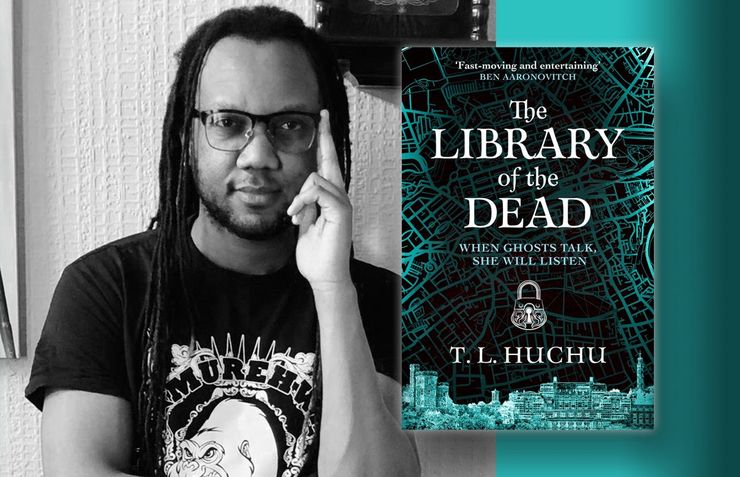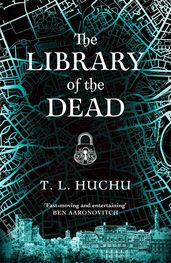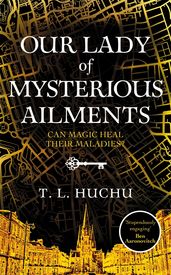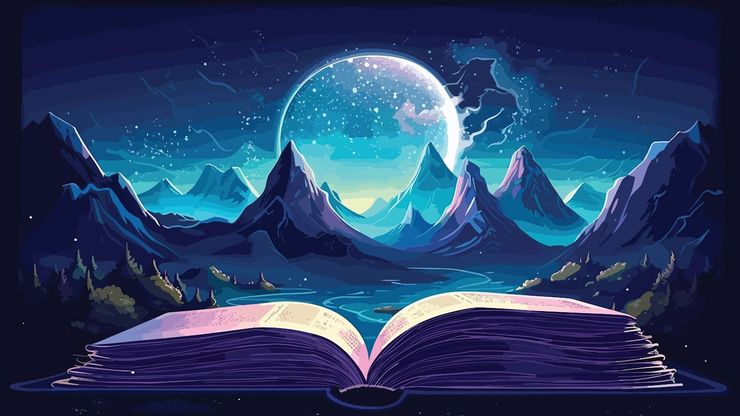T. L. Huchu on the Zimbabwean magic behind his fantasy novel
T. L. Huchu on how he drew inspiration from real Zimbabwean and Scottish stories of myth and magic for his novel The Library of the Dead.

The uncanny and unearthly are no strangers to T. L. Huchu. A Zimbabwean writer living in Scotland, his novels are finely attuned to both the occult superstitions of Zimbabwe and the historical myths of Scotland, standing them uniquely apart from other fantasy books. His fantasy novel The Library of the Dead artfully blends the two cultures into a thrilling mystery story that follows protagonist Ropa, who uses Scottish pragmatism and Shona magic on her journey into Edinburgh's supernatural underworld.
Here, he describes the various magical superstitions of his Zimbabwean relatives, why Edinburgh is the perfect surrogate home for Shona beliefs, and why the mysterious unknown is the foundation of all storytelling.
When my aunt passed away early this year I was reminded how I come from a family of magical thinkers. This is nothing unusual in the Zimbabwean context – we missed the Enlightenment. And so, I had to endure conversations with aunties speculating on which witch in the family caused the tragedy of my aunt’s death. This was wrapped up in incoherent evangelical cliches, biblical verses, Shona spiritual lore, etc., the sort of syncretism considered unremarkable where I am from.
‘I had to endure conversations with aunties speculating on which witch in the family caused the tragedy of my aunt’s death’
Witchcraft and dark magic are held responsible for virtually everything, even including the mundanest of things. For example, because I named the main character in The Library of the Dead Ropa, after a cousin I dearly love, this is held as incontrovertible proof by my aunties that I have ritualistically used my cousin’s name to further my artistic ambitions. In short, if you have read my book, worse still enjoyed it, then it isn’t because of any literary merit on my part, but more because of some vile sorcery, a pact I signed with the Dark Lord and so forth. Of course, my aunties also believe Harry Potter is satanic, bankers drink blood, the Illuminati/New World Order are pulling the strings from the shadows, Trump was trying to save Christians, coronavirus is a hoax, don’t get vaccinated, etc.
I’m used to this kind of thing; I’m an atheist surrounded by friends and family who have made attempts and interventions at various points to save my immortal soul with little success. The news from back home which I consume contains regular pieces on ghosts, money-spitting snakes, njuzu/mermaids, and all manner of sorcery reported as fact. Hell, in 2006 Zimbabwe amended the Witchcraft Suppression Act to acknowledge the existence of witches. The state-owned Herald newspaper reported that 'Until the amendment, it was a criminal offence to brand anyone a witch or wizard or to accuse someone of meddling in the supernatural, even where there was tangible evidence.' Former Vice Chancellor of the University of Zimbabwe Professor Gordon Chavhunduka hailed the amendment saying, 'This is a giant step in recognising the cultural belief of the majority of the people in the country. As custodians of the country's culture, we see the amendment as a step in the right direction towards asserting our culture that has been trampled upon by successive colonial governments.'
‘In Edinburgh today I have also met people who profess to be witches or wiccans.’
The Library of the Dead uses various stories and characters from the Scottish Enlightenment for inspiration. It is easy to draw parallels between Scotland three hundred years ago and Zimbabwe today. Scotland prior to the Union of 1707 was the poorest nation in Western Europe. It was a superstitious nation notorious for its witch trials which involved torture, forced confessions, dubious sentences, and gruesome executions. In Edinburgh today I have also met people who profess to be witches or wiccans. I have enjoyed the Samhain Fire Festival on Calton Hill and so I know these beliefs are far from dead. They are still with us and continue to confound as much as they fascinate.
Ropa Moyo, my main character, is a ghostalker – she makes a living passing messages between the living and the dead for a fee. To do this, she draws upon her heritage, using the traditional Shona musical instrument, the mbira, to aid her in conversations with the dearly departed here in Edinburgh. This wasn’t such a great leap to make in a city notorious for its ghosts. Why shouldn’t a key instrument in Shona spirituality work to commune with Scottish spectres? Through music, by finding the right song, Ropa is able to help these spirits deal with outstanding issues so they can move on. And boy, do they have issues!
I am drawn to the fantastic in fiction because I believe this is the original mode of storytelling. Think about the fairytales you loved as a child, the numerous religions we have and their fascinating myths, the weird and esoteric. This stuff is common to every culture. Creaking wood beams in your house at night, the voice that hails you on a deserted street but when you turn no one’s there, the shadow in the corner of your eye which vanishes when you turn to see it properly – this feeling we have that beyond the laws of physics, above logic, outside reason and rationality, something else is going on. That something is the stuff of magic.
‘I am drawn to the fantastic in fiction because I believe this is the original mode of storytelling’
Strip away our gizmos, science, and modern sophistication, and you will find we haven't changed at all. We’re drawn to the spooky, the irrational and the fantastic. Why? Only a wizard would know the answer to that one. All I can say with any surety is that this stuff is a lot of fun to write. I know I’m supposed to do the angsty, tortured writer schtick, but I enjoy working on this series too much. At the moment I’m working on edits for the next book, Our Lady of Mysterious Ailments (due out in Spring 2022), and I really hope readers enjoy the Edinburgh Nights series. But, if they think this stuff is purely made up, I hope they at least remember the fact that somewhere out there in the world are people who take this sort of stuff very, very seriously. . .
Maybe a little too seriously, in my opinion.
Discover the first two books in the Edinburgh Nights series, by T.L. Huchu:
The Library of the Dead
by T. L. Huchu
The first book in the Edinburgh Nights series, The Library of the Dead opens up a world of magic and adventure across the Scottish city.
Ropa is a ghostalker. She speaks to Edinburgh's dead, carrying messages back and forth between them and the living. After all, a girl's got to earn a living – and it seems harmless enough, until the dead start to whisper that someone is bewitching children into husks, empty of joy and life. Ropa feels bound to investigate, calling on Zimbabwean magic and Scottish pragmatism, but what she'll learn will change her entire world.
Our Lady of Mysterious Ailments
by T. L. Huchu
After discovering an occult underground library, Ropa Moyo had big expectations. Obsessed with the secret societies of Edinburgh, she soon learns that the feeling isn't mutual. So despite having bills to pay and a pet fox to feed, she is stuck with a rubbish, unpaid internship instead of being able to work with magic.
Then her friend Priya offers her a job on the side. Priya works at Our Lady of Mysterious Maladies, a very specialized hospital, where a new illness is resisting magical and medical remedies alike. Ropa's attempts to solve the case will lead her to a lost fortune, an avenging spirit, and a secret buried deep in Scotland's past. With lives at stake, Ropa is running out of time . . .
The second book in the Edinburgh Nights series by T.L. Huchu.




